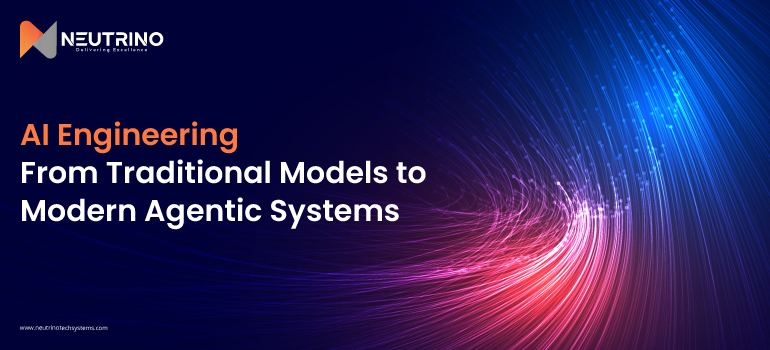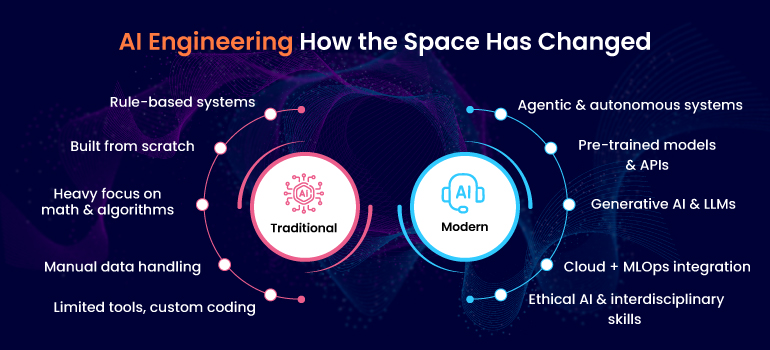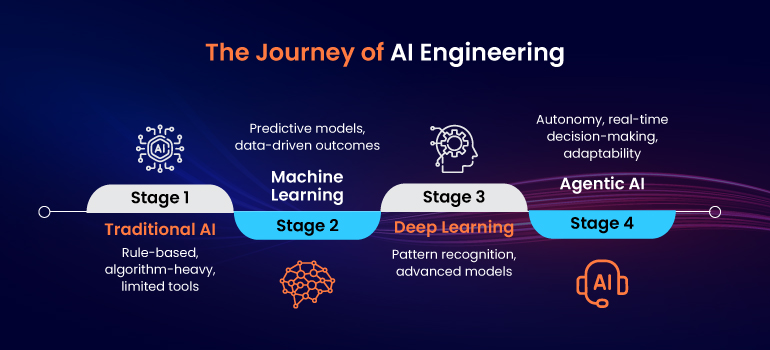AI Engineering: From Traditional Models to Modern Agentic Systems

- September 12, 2025
AI Engineering is evolving at an unprecedented pace, transforming skills, workflows, and industry expectations. What began with traditional rule-based systems advanced through machine learning and deep learning, and is now entering the era of agentic AI, where systems make autonomous decisions and adapt in real time. This shift is reshaping industries, as engineering teams harness AI to automate tasks, analyze vast datasets, and deliver predictive insights with greater speed and precision.
Modern AI engineering enables scalable, intelligent systems that drive innovation and efficiency, but it does not replace the enduring importance of traditional expertise. Human judgment, creativity, and ethical responsibility remain essential, ensuring that AI serves as a powerful partner rather than a substitute. The future of AI engineering lies in combining advanced intelligence with human insight to create solutions that are both transformative and responsible.
Traditional AI Engineering Requirements
In the early days, AI engineering was primarily academic or research-focused, emphasizing:
- Strong Mathematical Background: Deep expertise in mathematics (linear algebra, calculus, statistics, probability) was essential, since engineers often developed algorithms from scratch.
- Programming Fundamentals: Proficiency in programming languages such as C++, Java, and early Python was crucial for building AI algorithms.
- Algorithm Design & Data Structures: Understanding and manually implementing algorithms (e.g., decision trees, search algorithms) and data structures.
- Data Management: Ability to handle data pre-processing, cleaning, and storage manually.
- Domain Expertise: Knowing the business or scientific problem was highly valuable, as AI models were rarely general-purpose.
- Limited Tools: There were fewer libraries and frameworks; engineers built much from scratch, meaning more custom coding and infrastructure work.

Modern AI Engineering Requirements
Today’s AI engineering space has evolved dramatically and is far more industry-driven:
- Programming Proficiency: Python is now dominant, thanks to its robust libraries (NumPy, Pandas, TensorFlow, PyTorch). Engineers must write production-ready code and manage software lifecycles.
- Tool & Framework Expertise: Engineers work with sophisticated frameworks (TensorFlow, PyTorch, Keras), focusing more on leveraging and fine-tuning models than building everything from scratch.
- Machine Learning & Deep Learning: Understanding both classic ML techniques and current state-of-the-art methods (transformers, large language models) is critical.
- System Integration: Modern roles require integrating pre-trained models via APIs, handling prompt engineering, Retrieval-Augmented Generation (RAG), and optimizing inference and deployment for real-world applications.
- Big Data & Cloud: Familiarity with big data technologies (Spark, Hadoop) and cloud platforms (AWS, Azure, GCP) is standard for managing, processing, and deploying models at scale.
- DevOps & MLOps: Automation and deployment skills (CI/CD for ML, containerization, model monitoring) are integral to deploying reliable, maintainable AI solutions.
- AI Ethics & Governance: Modern engineers address responsible AI, fairness, explainability, and regulatory requirements as part of their workflow.
- Interdisciplinary Soft Skills: Communication, business acumen, and collaboration with cross-functional teams (data science, product, domain experts) are now expected.
Leveraging Generative AI, LLMs, and Agentic AI
The rise of generative AI models and large language models (LLMs) has introduced new paradigms in AI engineering. Engineers now utilize these models as foundational tools to build agentic AI systems, autonomous or semi-autonomous agents that perform tasks, make decisions, and interact in dynamic environments. This requires expertise in:
- Designing and deploying AI agents powered by LLMs.
- Employing prompt engineering to elicit desired behaviors.
- Integrating multi-modal data inputs and feedback loops.
- Managing safety, alignment, and ethical considerations unique to agentic AI systems.

How AI Engineering Has Changed
Modern AI engineers are crucial because they enable businesses and products to quickly leverage powerful pre-trained models, such as large language models (LLMs) and generative AI, without needing to build models from scratch. Their knowledge of using LLMs, generative AI libraries, and multi-modal AI agents allows them to create advanced AI applications that can handle text, images, and more in a seamless way.
This expertise helps organizations stay competitive by rapidly deploying innovative AI-powered solutions that are scalable, flexible, and aligned with real-world needs. Understanding these tools is essential for modern AI engineers to design and integrate intelligent systems that truly unlock the potential of AI today.
Key Aspects
- From Research to Production: The focus has shifted from theoretical modeling to building scalable, production-ready AI systems that operate in real-world environments.
- Rapid Prototyping and Deployment: Thanks to reusable components, transfer learning, and cloud tools, engineers can bring ideas to market much faster.
- Team Coordination: AI projects now require coordination between engineers, data scientists, product managers, ethicists, and business stakeholders.
- Continuous Learning: The pace of change in AI is rapid. Engineers must keep updating their skills, learning new frameworks, and adapting to emerging technologies (e.g., generative AI, autonomous systems, digital twins).
- Impact on Engineering Domains: AI is transforming traditional fields, such as predictive maintenance, design automation, and generative design are just a few areas disrupted by modern AI.
The Emergence of Agentic AI Systems
Agentic AI marks a fundamental shift from traditional AI systems, with its defining features being autonomous operation, proactive decision-making, and adaptability to changing environments, all while working seamlessly with other tools and systems.
- Gartner predicts that by 2028, 33% of enterprise software will incorporate agentic AI, a massive leap from under 1% in 2024.
- As of early 2025, 79% of organizations report having adopted AI agents to some degree, with 96% planning expansion within 12 months.
- The agentic AI market is expected to exceed $10 billion globally in 2025, with a CAGR above 43% through the next decade.
These indicators demonstrate that agentic AI is rapidly transforming enterprise software, enabling more autonomous, efficient, and intelligent systems that reshape workflows and decision-making at scale.
Key Tech Stacks for Modern Agentic AI Engineers
- Programming Languages: Python remains dominant due to its ecosystem and AI library integration.
- Large Language Models (LLMs): Pre-trained models like OpenAI GPT, Anthropic Claude, Google Bardtypically accessed via APIs.
- Prompt Engineering: Techniques and tools for guiding AI behavior with precise outputs.
- Agent Orchestration Frameworks:
- LangChain: Build complex LLM-based applications with chains, agents, and memory.
- LangGraph: Enables stateful, cyclic, multi-actor AI workflows with complex decision-making.
- MCP (Model Context Protocol): Connects AI models with external tools and data for real-time, context-aware responses.
- Supporting Technologies: Vector databases, cloud platforms (AWS, Azure, GCP), containerization, and MLOps tools.
These tools ensure modern engineers can design scalable, intelligent systems that act autonomously and adaptively in dynamic environments.
Wrapping Up
AI Engineering should not be seen as a threat but as a powerful partner that elevates and complements human expertise. While it accelerates efficiency, scalability, and innovation, it cannot replace the uniquely human qualities of judgment, creativity, and ethical reasoning. The shift from rule-based systems to modern AI, powered by machine learning, deep learning, and large language models, has opened the way for agentic AI that can execute multi-step processes, make real-time decisions, and adapt across industries.
Leading enterprises are already embracing this transformation, creating intelligent systems that redefine productivity and impact. At Neutrino, we are advancing this vision by developing AI engineering solutions that combine cutting-edge frameworks with strong engineering principles, ensuring that innovation is always balanced with responsibility. By uniting the power of AI with human insight,
Neutrino is helping shape a future where engineering is smarter, faster, ethical, and transformative.
